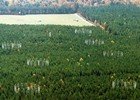Warming accelerates decomposition of decades-old carbon in forest soils, and subsequent release of CO2
Soils store more than twice as much carbon as the atmosphere. Upon microbial decomposition, carbon can be released again as CO2 into the atmosphere, but its residence time in the soils is largely unknown. In particular, the effect of warming on the decomposition of decade-old carbon, which makes up the majority of soil carbon stocks in temperate forest soils, is highly debated.

“Using these approaches, we first confirmed that about two-thirds of carbon stored in each soil was more than a decade old, consistent with other temperate and tropical estimates”, says Francesca M. Hopkins, lead author of the study and PhD student at the University of California, Irvine, USA.
To study how temperature affected the age structure of decomposing carbon, top soils from the two field sites were incubated at increasing temperatures. In the decomposition-derived CO2 flux, the proportion of decade-old carbon, distinguished based on its isotopic signature, did not change with warming. “Surprisingly, this suggests that temperature sensitivity of decade-old carbon is the same as that of the younger carbon” says Prof. Susan Trumbore, Max Planck Director in Jena and head of the international study group.
Since decade-old soil carbon represent a major portion of soil carbon stocks, its temperature sensitivity ultimately controls the magnitude of feedback between soil carbon and climate warming. “Our finding that decade-old carbon is vulnerable to warming suggests the potential for release of soil carbon to the atmosphere as CO2 as temperatures warm, which in turn would lead to more warming”, Trumbore points out. [EF]
